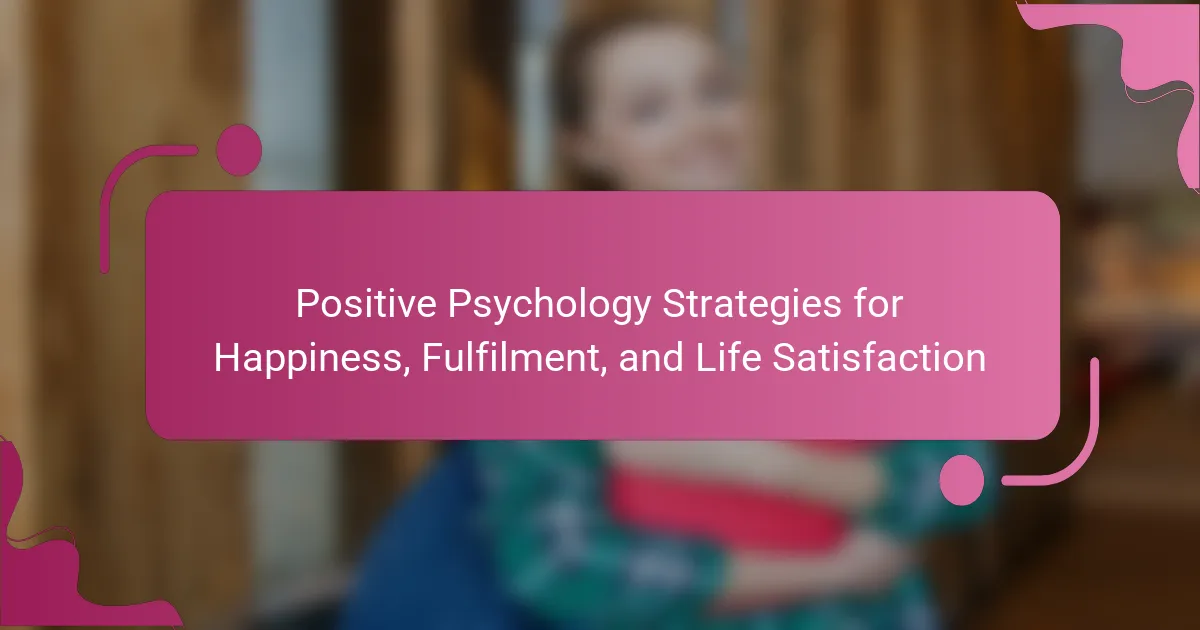Enhancing happiness and life satisfaction can be achieved through positive psychology strategies. Key practices include cultivating gratitude, fostering social connections, and setting meaningful goals. Mindfulness techniques promote present-moment awareness, while unique approaches like deep gratitude journaling offer additional benefits. Understanding cultural variations in these practices can further enhance their effectiveness.
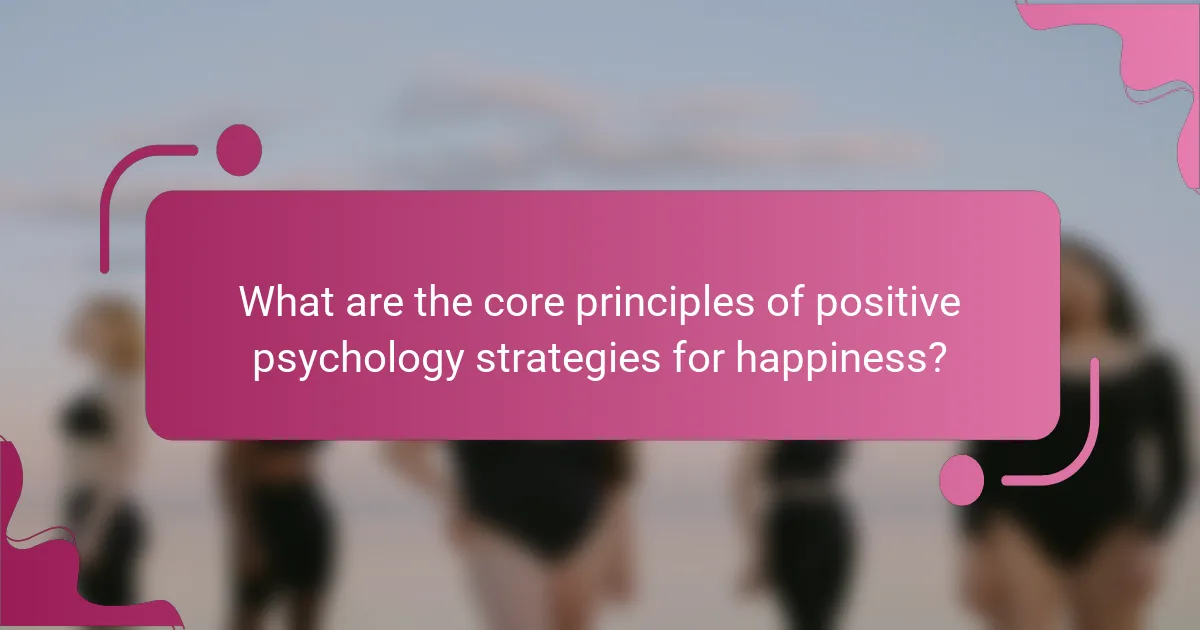
What are the core principles of positive psychology strategies for happiness?
Positive psychology strategies for happiness focus on enhancing well-being through specific practices. Key principles include cultivating gratitude, fostering positive relationships, and engaging in meaningful activities. These strategies encourage individuals to identify strengths and use them effectively, promoting a sense of fulfillment. Incorporating mindfulness and resilience-building techniques further supports sustained happiness.
How do these principles enhance life satisfaction?
Positive psychology principles enhance life satisfaction by fostering resilience, promoting positive relationships, and encouraging personal growth. These strategies help individuals focus on strengths rather than weaknesses, leading to increased happiness and fulfillment. Engaging in activities that promote gratitude and mindfulness can significantly boost overall life satisfaction. As a result, individuals experience improved mental well-being and a greater sense of purpose in their lives.
Which psychological theories underpin these strategies?
Positive psychology strategies are grounded in several key psychological theories. These include Maslow’s Hierarchy of Needs, which emphasizes self-actualization as essential for fulfillment. Another influential theory is Seligman’s PERMA model, focusing on Positive Emotion, Engagement, Relationships, Meaning, and Accomplishment as pillars of well-being. Additionally, Self-Determination Theory highlights the importance of autonomy, competence, and relatedness in fostering happiness. These theories collectively support the implementation of strategies aimed at enhancing life satisfaction and overall happiness.
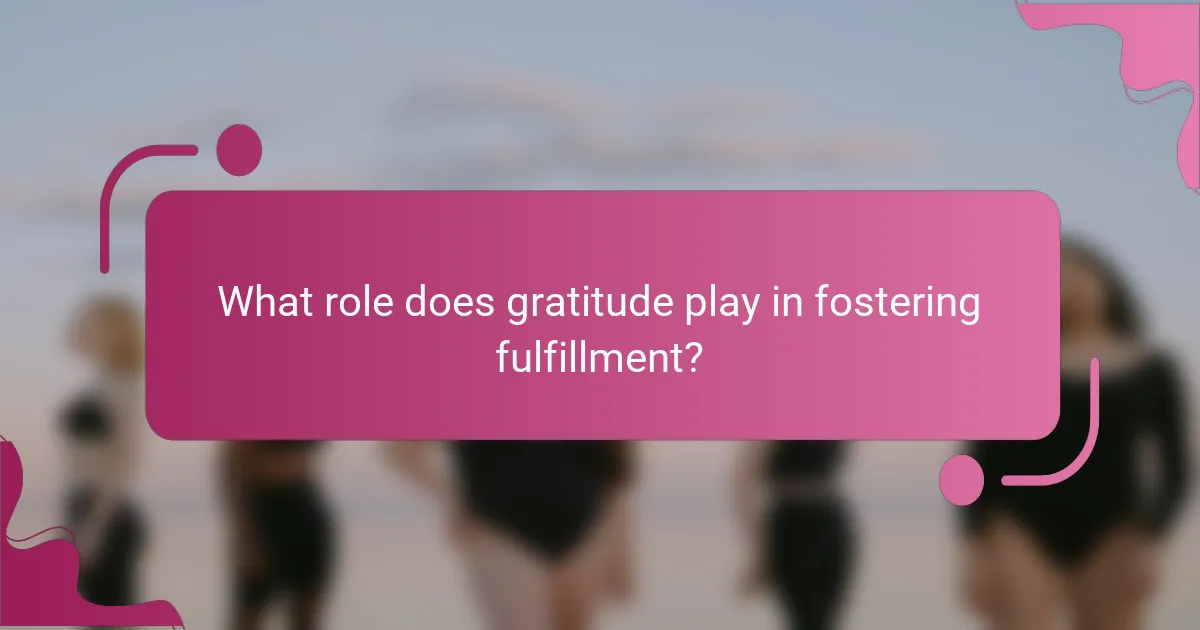
What role does gratitude play in fostering fulfillment?
Gratitude significantly enhances fulfillment by fostering positive emotions and strengthening relationships. It shifts focus from what one lacks to appreciating what one has, leading to increased life satisfaction. Research shows that practicing gratitude can improve mental well-being, reduce stress, and promote resilience. Individuals who regularly express gratitude report higher levels of happiness and fulfillment, illustrating its vital role in positive psychology.
How can gratitude be effectively practiced daily?
Gratitude can be effectively practiced daily by incorporating simple habits. Start each day by writing three things you are grateful for. This practice enhances positive emotions and overall life satisfaction. Additionally, express gratitude to others regularly, whether through notes, messages, or verbal acknowledgments. Engaging in these actions fosters deeper connections and reinforces positive psychology strategies. Consider keeping a gratitude journal to track your reflections over time, which can serve as a reminder of the positive aspects of your life.
What research supports the benefits of gratitude?
Research consistently shows that practicing gratitude enhances happiness and life satisfaction. Studies indicate that individuals who regularly express gratitude report higher levels of positive emotions and lower levels of depression. For instance, a study published in the Journal of Personality and Social Psychology revealed that participants who kept gratitude journals experienced increased well-being and life satisfaction over time. Another research found that gratitude interventions led to improved psychological health and stronger social connections. These findings underscore gratitude as a powerful positive psychology strategy for fostering fulfillment and happiness.

How does mindfulness contribute to overall happiness?
Mindfulness significantly enhances overall happiness by promoting present-moment awareness and reducing stress. It fosters emotional regulation, leading to increased life satisfaction. Studies show that regular mindfulness practice correlates with higher levels of positive emotions and lower levels of negative emotions. This practice cultivates gratitude and compassion, further contributing to a fulfilling life.
Which mindfulness techniques are most effective?
Mindfulness techniques such as meditation, deep breathing, and gratitude journaling are highly effective for enhancing happiness and life satisfaction. These practices cultivate awareness and foster positive emotions.
Meditation promotes mental clarity and reduces stress, leading to a more fulfilling life. Deep breathing exercises can quickly alleviate anxiety, grounding individuals in the present moment. Gratitude journaling encourages reflection on positive experiences, boosting overall well-being.
Research indicates that regular practice of these techniques can significantly improve emotional resilience and life satisfaction. For example, a study found that participants who practiced mindfulness reported a 30% increase in happiness levels over six months.
What are the long-term effects of mindfulness on mental health?
Mindfulness has significant long-term effects on mental health, enhancing emotional regulation and reducing anxiety. Regular practice fosters resilience, leading to improved overall well-being. Studies indicate that individuals who engage in mindfulness experience lower levels of depression and greater life satisfaction. Additionally, mindfulness can cultivate a positive mindset, promoting sustained happiness and fulfillment.

What impact does social connection have on life satisfaction?
Social connection significantly enhances life satisfaction by fostering emotional support and a sense of belonging. Research shows that individuals with strong social ties report higher levels of happiness and fulfillment. Engaging in meaningful relationships can lead to improved mental health and resilience. For example, studies indicate that social support can reduce stress and promote positive emotions.
How can individuals build and maintain supportive relationships?
Individuals can build and maintain supportive relationships by practicing active listening, expressing gratitude, and engaging in shared activities. These strategies foster connection and enhance mutual understanding.
Active listening involves fully concentrating on what others say, validating their feelings, and responding thoughtfully. This practice strengthens trust and encourages open communication.
Expressing gratitude, whether through verbal acknowledgment or small gestures, reinforces positive interactions and helps individuals feel valued. Regularly showing appreciation can significantly enhance relationship satisfaction.
Engaging in shared activities, such as hobbies or volunteer work, creates opportunities for bonding and shared experiences. These moments can deepen emotional connections and promote a sense of belonging.
What are the cultural differences in valuing social connections?
Cultural differences significantly influence how social connections are valued. In collectivist cultures, strong community ties and family bonds are prioritized, fostering support networks. Conversely, individualistic cultures emphasize personal achievement and autonomy, often valuing friendships based on shared interests. These cultural frameworks shape emotional well-being and life satisfaction. For instance, research indicates that social support is linked to increased happiness in collectivist societies, while individualistic cultures may derive satisfaction from personal accomplishments. Understanding these differences enhances positive psychology strategies for fostering happiness and fulfillment.

How can goal setting enhance fulfillment and happiness?
Goal setting enhances fulfillment and happiness by providing clear direction and purpose. It fosters motivation, creates a sense of achievement, and encourages personal growth. Research shows that individuals who set specific, measurable goals experience higher levels of satisfaction. Additionally, achieving goals boosts self-esteem, reinforcing a positive feedback loop that contributes to overall well-being.
What types of goals are most beneficial for personal growth?
Setting specific, measurable, achievable, relevant, and time-bound (SMART) goals fosters personal growth effectively. These goals enhance self-awareness, motivation, and resilience.
1. Self-improvement goals focus on enhancing personal skills or attributes, such as communication or emotional intelligence.
2. Career goals aim for professional advancement, leading to increased job satisfaction and fulfillment.
3. Health and wellness goals promote physical and mental well-being, contributing to overall life satisfaction.
4. Relationship goals strengthen connections with others, improving social support systems.
5. Financial goals ensure stability and reduce stress, aiding in long-term happiness.
Engaging in these types of goals nurtures a positive mindset, aligning with positive psychology principles.
How can the SMART criteria be applied to goal setting?
The SMART criteria enhance goal setting by ensuring goals are Specific, Measurable, Achievable, Relevant, and Time-bound. This structured approach fosters clarity and motivation, essential for achieving happiness and fulfillment. Each element of SMART aligns with positive psychology principles, promoting effective planning and personal growth. For example, a specific goal like “exercise three times a week” is measurable and achievable, contributing to overall life satisfaction. By applying the SMART framework, individuals can create meaningful objectives that support their pursuit of happiness.
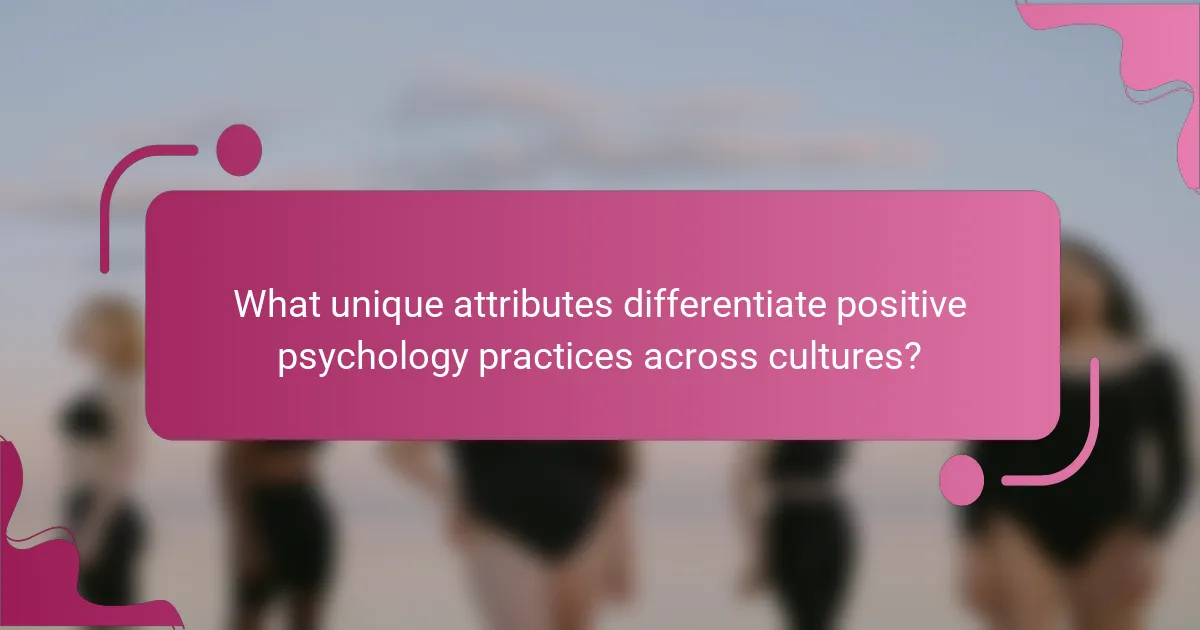
What unique attributes differentiate positive psychology practices across cultures?
Positive psychology practices vary across cultures due to unique attributes such as values, social norms, and expressions of happiness. Cultural context shapes how individuals perceive fulfillment and life satisfaction. For instance, collectivist cultures may emphasize community well-being, while individualistic cultures focus on personal achievements. Additionally, practices like gratitude rituals differ; some cultures prioritize communal celebrations, while others may value private reflection. Understanding these distinctions enhances the effectiveness of positive psychology strategies globally.
How do cultural values influence the perception of happiness?
Cultural values significantly shape how individuals perceive happiness. Different cultures prioritize various aspects of life, influencing their definitions of fulfillment and satisfaction.
For instance, collectivist cultures often emphasize community and relationships, leading to a sense of happiness derived from social harmony. In contrast, individualistic cultures may focus on personal achievements and self-expression, shaping happiness through personal success and autonomy.
Research indicates that these cultural frameworks can determine the strategies people employ to enhance their well-being. For example, individuals in collectivist societies may engage in cooperative activities, while those in individualistic societies might pursue self-improvement initiatives.
Understanding these cultural influences is essential for developing positive psychology strategies tailored to diverse populations, ultimately enhancing life satisfaction across different cultural contexts.
What are some region-specific positive psychology interventions?
Region-specific positive psychology interventions include culturally tailored practices that enhance well-being. In Japan, Shinrin-yoku, or forest bathing, emphasizes nature’s restorative effects. In India, yoga and mindfulness meditation foster mental clarity and emotional balance. In Sweden, lagom promotes a balanced lifestyle, encouraging moderation and contentment. In Brazil, community gatherings and samba celebrate social connections and joy. In Australia, bushwalking combines physical activity with nature appreciation, enhancing happiness. Each intervention reflects unique cultural values and contributes to overall life satisfaction.
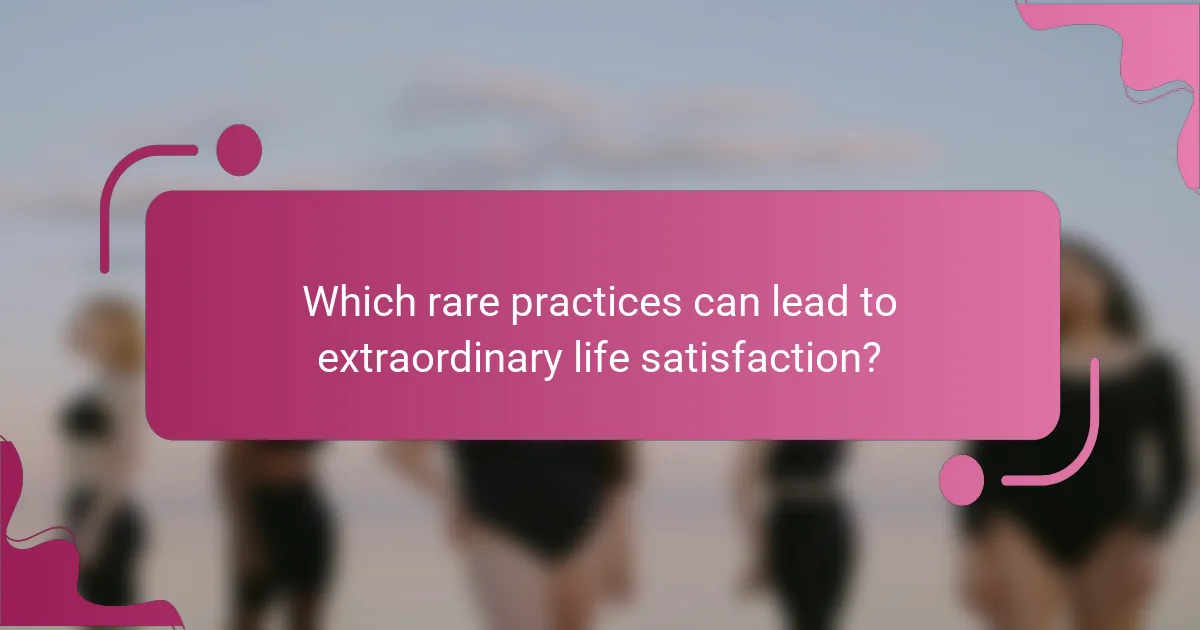
Which rare practices can lead to extraordinary life satisfaction?
Engaging in rare practices can significantly enhance life satisfaction. Unique strategies such as deep gratitude journaling, immersive nature experiences, and intentional acts of kindness stand out. These approaches foster profound connections and boost overall happiness.
What unconventional strategies have shown effectiveness in boosting happiness?
Unconventional strategies that boost happiness include practicing gratitude, engaging in acts of kindness, and embracing mindfulness. These approaches foster positive emotions and enhance life satisfaction.
Gratitude practices, such as keeping a gratitude journal, can increase overall happiness by shifting focus to positive experiences. Acts of kindness, like volunteering, create a sense of connection and purpose. Mindfulness meditation helps individuals stay present, reducing anxiety and increasing emotional resilience.
Research indicates that these strategies can lead to significant improvements in well-being. For example, individuals who regularly practice gratitude report higher levels of happiness and lower levels of depression. Emphasizing these unconventional methods can enhance fulfillment and life satisfaction.
How can individuals discover their unique paths to fulfillment?
Individuals can discover their unique paths to fulfillment by engaging in positive psychology strategies that enhance happiness and life satisfaction. These strategies include identifying personal strengths, practicing gratitude, and setting meaningful goals. Research shows that focusing on strengths can lead to greater well-being, while gratitude practices can improve emotional resilience. Additionally, setting specific and achievable goals fosters a sense of purpose and direction, contributing to overall life satisfaction. Embracing these approaches enables individuals to create a fulfilling and meaningful life.
What are the common pitfalls in pursuing happiness and fulfillment?
Common pitfalls in pursuing happiness and fulfillment include unrealistic expectations, comparison with others, and neglecting personal values. Many individuals chase external validation, leading to fleeting satisfaction. Additionally, focusing solely on achievements can overshadow the importance of relationships and experiences. Embracing gratitude and mindfulness can mitigate these pitfalls, fostering a deeper sense of contentment.
What expert tips can enhance the effectiveness of positive psychology strategies?
To enhance the effectiveness of positive psychology strategies, focus on gratitude, mindfulness, and social connections. Practicing gratitude can increase overall happiness by shifting focus to positive experiences. Mindfulness helps individuals stay present, reducing stress and enhancing emotional regulation. Building strong social connections fosters support and boosts life satisfaction. Additionally, setting achievable goals can provide a sense of purpose, further contributing to fulfillment. Engaging in regular physical activity also positively impacts mental well-being, promoting a healthier mindset.
